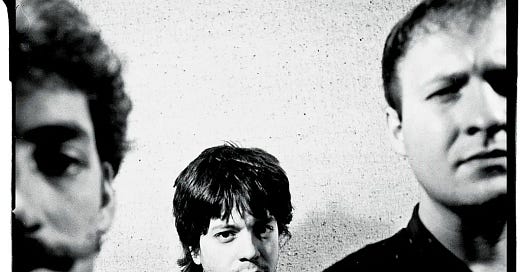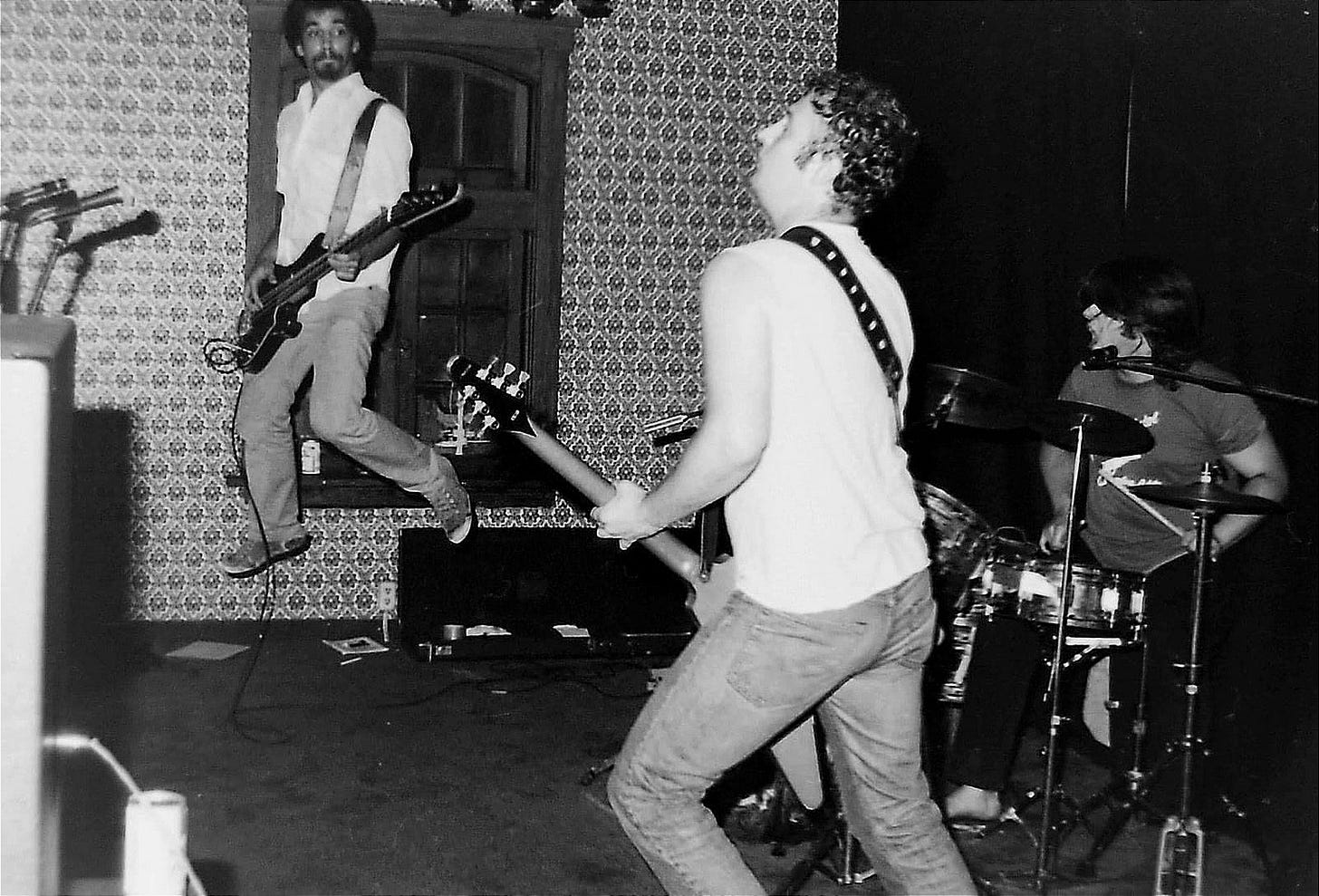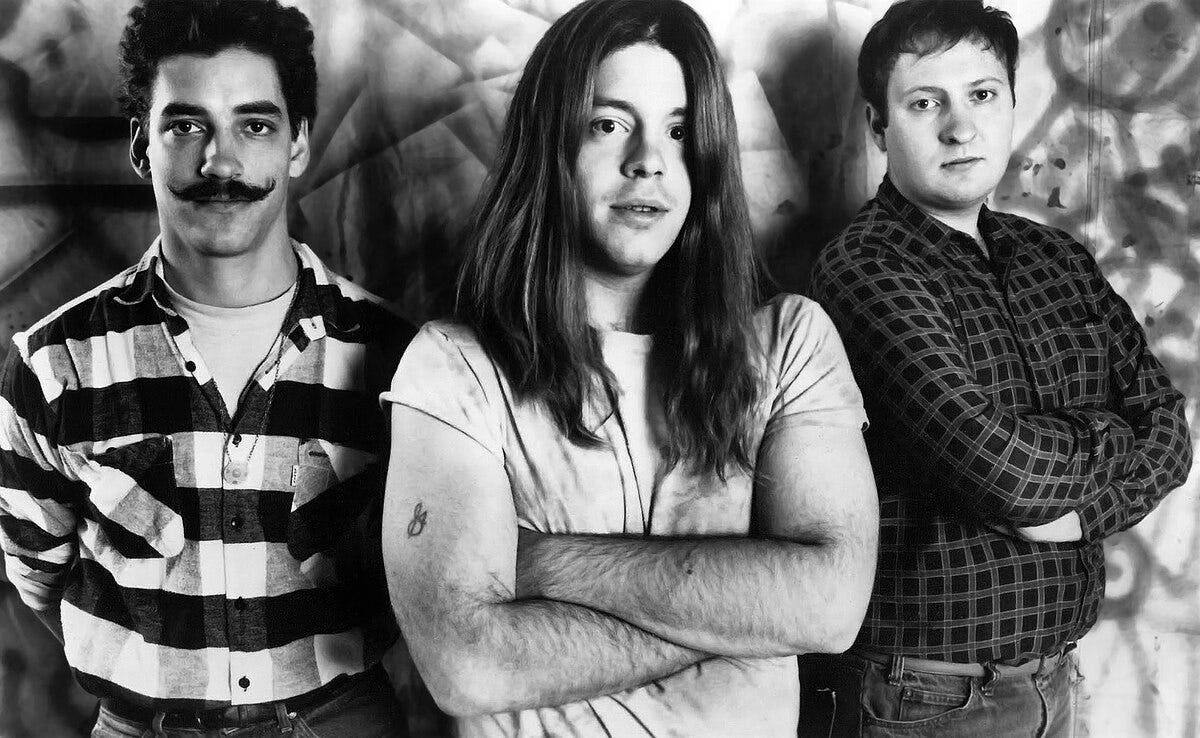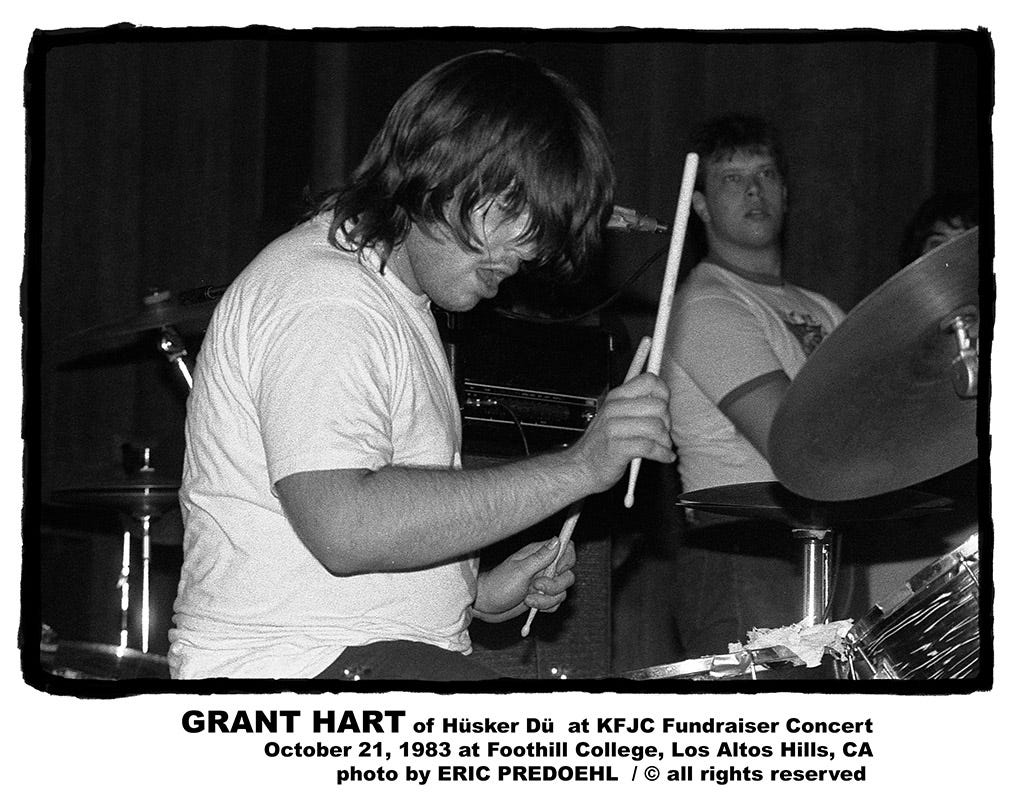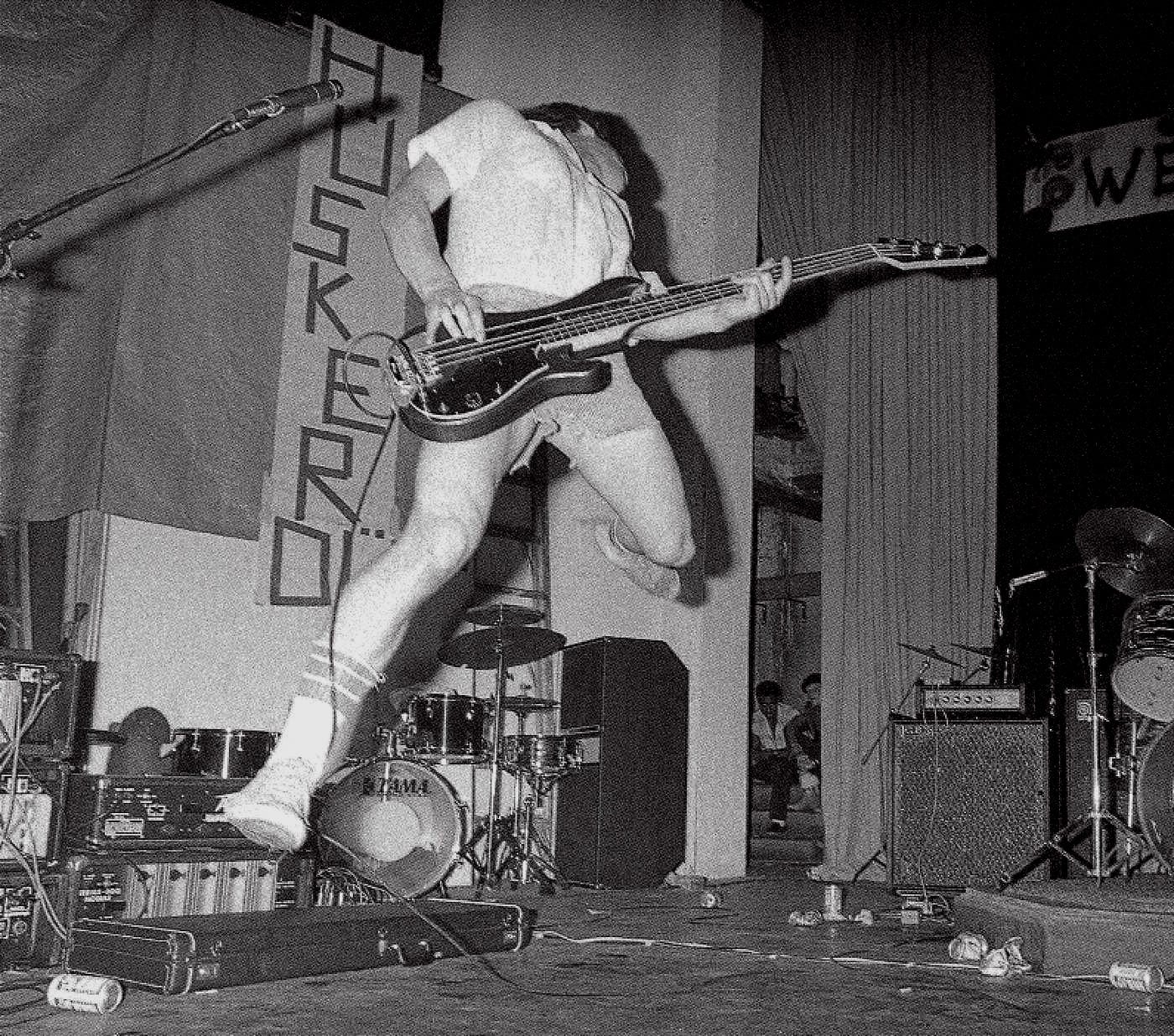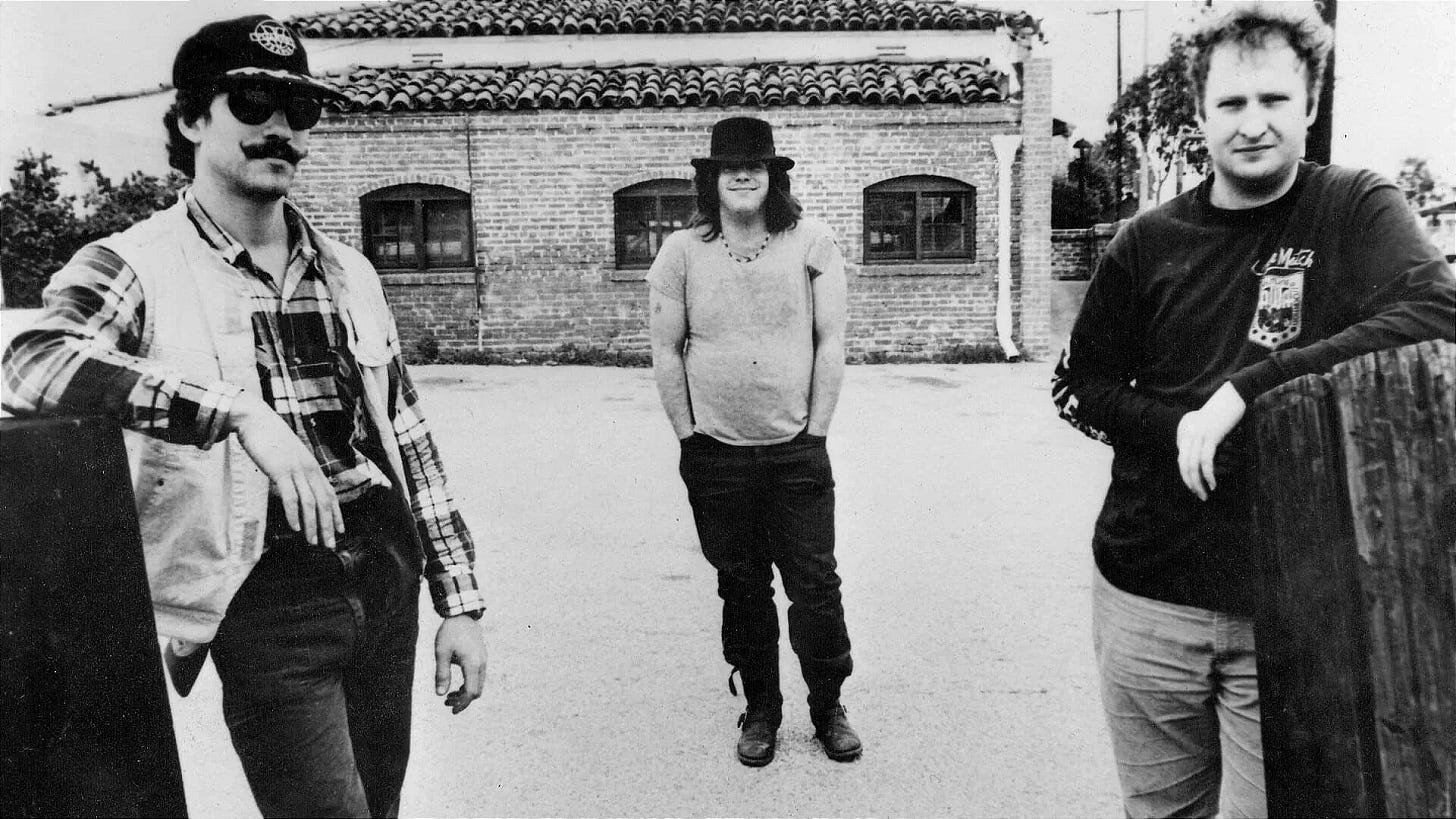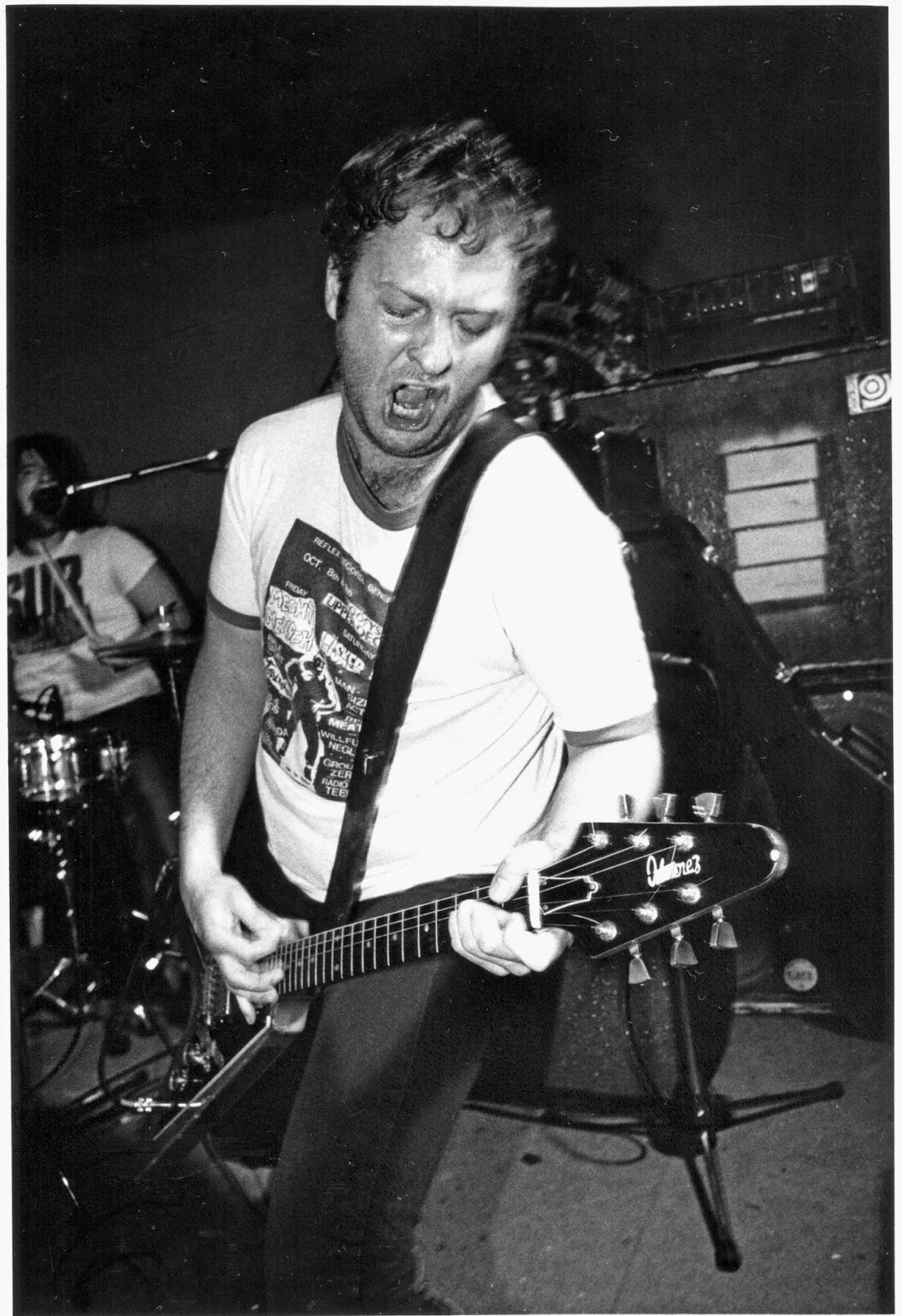HÜSKER DÜ: THE WARNER BROS. ALBUMS
Much maligned in some quarters, I argue the case for the final two LPs from Hüsker Dü. Far from selling out, the band created a pair of timeless classics that don't deserve their bruises.
Look - I wasn’t there in the early 80s. I didn’t realise that the abrasive hardcore that was flinging itself across sticky basement floors was even a thing at the time. I was too wrapped up in post-punk, goth and NWOBHM in my teen years to have those earliest ground-breakers by Hüsker Dü make an impression on me like they did to so many of the bands I love.
To me, it was the later Düs that meant the world - Could You Be The One? would get played every week at an alternative club I frequented. Occasionally Makes No Sense At All.
That was where the magic of Bob Mould and Grant Hart’s songwriting was conjured and what made the band indispensable to me from thereon in.
I worked backward from Warehouse Songs and Stories - and still - even now, having developed a broader understanding and more nuanced appreciation of music, the marriage of melody and power of the band’s later albums holds me enthralled more deeply than the brittle, shimmering screaming blitzkrieg of Land Speed Record, Metal Circus and Everything Falls Apart, although I can obviously appreciate their historic importance and occasional brilliance.
SPOILER ALERT: CONTROVERSIAL OPINION INCOMING:
Zen Arcade is not the pinnacle of their output for me.
I understand that I’m in a minority of one, and though I recognise its undisputed genius in the timeline of punk rock’s evolution, I just don’t see it as the masterpiece that everyone else does - at least through the retrospective eyes of a listener unencumbered by a contemporary involvement with the early 80s hardcore scene.
It’s a great album - don’t misconstrue me - but whereas the accepted truth is that it all led TO that moment, I feel it all leads FROM it.
The four albums that the band punched out in the three years following Zen Arcade are incomparable. Each one rammed to the gills with near-perfect tunes, crafted to elevate spirits, jerk tears and bruise emotions.
From New Day Rising’s elegant balance between raw speed and melody to Warehouse’s exploration of clarity, dynamics and pop perfection, that run of four LPs feels like a launchpad for an entire industry to base the next decade’s output on.
It’s easy to poke and draw an obvious snark at how the band ‘sold out’ when they signed to Warner Bros after Flip Your Wig - and I get it - the latter Hüskers bear little resemblance to the noisniks of the pre-Zen Arcade era. But that doesn’t mean they sold themselves down the river. As far as I can tell, and I may be wrong, there was no corporate interference or redirection foisted upon them.
I can’t imagine either Grant or Bob - or Greg, for that matter - accepting it if there was.
They retained their integrity, they just moved in an ever-evolving direction, embracing a more melodic, but equally natural destiny.
Of the two Warner Bros albums, Warehouse is my favourite. It’s a rare example of a justified double LP. There’s no filler on here – even the weaker tracks are still strong enough to justify their inclusion -although you’ll see, as I wrote this piece, my mind changed slightly, once nostalgia was foregone.
Its predecessor, Candy Apple Grey includes a couple of ringers that would have been skipped in the CD years but are tolerated on vinyl.
Regardless, I am here today to die on this hill: The Warner Bros Albums Are Underrated.
CANDY APPLE GREY: 1986
Opener Crystal is a noisy maelstrom, feeling shouty enough to belong on New Day Rising, with Bob’s chugs and yelps foreshadowing noisier elements of the mid-west guitar rock that was just around the corner - I can even see a lineage between Crystal and some of the lighter moments from the AmRep catalogue in the way the guitars squall, at least.
Don’t Wanna Know If You Are Lonely is, of course, one of greatest pop moments Da Dü ever committed to tape. Blistering, heartfelt, Grant at his best.
The two tracks that follow are both fairly mediocre. Definitely not skippable, but all the same - not favourites of mine.
Bob’s I Don’t Know For Sure is a little by the book and Grant’s Sorry Somehow becomes aggravating as it heads towards its close. I’m a Bob boy, really; Grant’s voice wears on me in some songs - Sorry Somehow being one of them.
Meh.
Too Far Down often gets dismissed as cringey and melodramatic in some quarters - listeners citing Bob’s acoustic agony as being overly maudlin.
For me, it’s always been the standout track on Candy Apple Grey. I can see how that might be an unpopular opinion, especially for fans looking for screaming glass-shattering distortion, but the lyrics and the melody have always affected me deeply. It’s a fantastic paean to depression, which he must have been suffering from, fairly considerably, to have written it. It exposes how trapped and frustrated Bob must have been feeling at the time - within the band and out of it.
Hardly Getting Over It is Too Far Down’s less successful cousin. It’s OK - again, heavily acoustic, but this time we don’t really go anywhere, which results in something of a bland ballad.
The one-two punch of Dead Set On Destruction and Eiffel Tower High restore your faith in the Hüskers. The pace is picked up a bit and both songs could have sat comfortably on Flip Your Wig. Eiffel Tower High foreshadows the next LP’s Standing In The Rain, the songs are structurally and rhythmically so similar.
And both great.
Unfortunately, the LP kind of ends there, for me - the whimsical No Promise Have I Made and forgettable All This I’ve Done For You sound like half decent B-Sides at best.
It’s a shame it ends on a dribble rather than a spurt, but nevertheless, Candy Apple Grey still stands up as a good - if not great - Hüsker Dü LP.
It would have made a staggering six track mini-LP.
WAREHOUSE SONGS AND STORIES: 1987
In comparison, Warehouse Songs and Stories overshadows Candy Apple Grey - it’s so consistently euphoric that my mind is blown when I consider the rapidity with which the band were kicking these incredible tunes out. Truly amazing.
I loved Sugar and I’m a fan of Bob’s solo work. I like Nova Mob and consider the vast majority of the Hüsker Dü catalogue as absolutely vital - and yet it all pails into insignificance once the Best Album Opener Ever, These Important Years, launches the LP.
Don’t get me wrong - the production is awful. I’d love to hear a reworked, remixed and remastered version of the album that made Grant’s drums powerful instead of thin and papery and boosted Greg’s bass. It’s a hurdle you need to get over as a listener – much like when listening to the original Misfits – the recordings are pretty crappy.
The songs deserve better treatment, but the writing is the best of their career.
Even the über pop of Grant’s Charity, Chastity, Prudence and Hope, which is made great by Bob’s guitar, not Grant’s rather irritating singing.
The aforementioned Standing In The Rain comes next and competes with Could You Be The One? as track of the LP. Yes - it recalls EIffel Tower High - but the lyrics are so engaging it elevates even higher than that:
“I should have guessed that you’d stand me up
Why did I even go now?
I guess it goes to show…
The snow may well thaw out
But it goes right down the drain
You left me standing in the rain”
Immense.
Back From Somewhere may be one of Grant’s best. There’s a faint tinge of rock and roll about its cadence and rhythm - but it’s a song with real texture, interesting time changes and melodic advances. It could even be an album highlight.
But then we have the majestic Ice Cold Ice - a Bob song, but it’s Grant’s responses to Bob’s calls that give it the nagging urgency that stays with you for such a long time after it’s done. A good choice for a single - which it was - in the UK, at least.
And it’s got a false ending, which is always fun.
You’re A Soldier is the first less-than-stellar offering on Warehouse… it’s fine - another Grant song, and in less esteemed company, it’d be a contender, but surrounded by such masterful works, it comes across as disposable and weak, lyrically and melodically.
Could You Be The One? is next, and as it was my introduction to the band, I admit my feelings are undoubtedly tarred by nostalgia. But still - nearly 40 years later - it sends shivers - the stops and starts, the guitar lines, the urgency, the melodies, the lyrics.
It’s a perfectly crafted song, regardless of genre. Every note is considered. The sentiment is ageless. What a corker.
Too Much Spice redeems You’re A Soldier with Grant’s more engaging vocal performance and lyrical suss, directed towards the aftermath of indulgence, in one form or another:
“There was a time, there was a space, there was a reason
There was a situation comfortable for you
You’ve tasted everything in this here bag of season
But now you’re bored and you’ve run out of things to do…
And you’re coloring your life with too much spice”
Bob follows that up with the jostling Friend, You’ve Got To Fall - with standout bass lines by Gregg and the über profound chorus:
“There’s nothing wrong with having aspirations,
Nothing wrong with walking tall
But if misfortune deals the consequences
Sooner or later friend, you’ve got to fall”
Each chorus maintains the same melody, but changes the lyrics; a songwriting device that relies on the tune more than the words to prick your ears. It’s a trick Bob uses frequently, but it works to especially great effect here.
The second side draws to a close with the fantastic Visionary and the slightly less so – and waltzing - She Floated Away, which becomes an earworm in a less than positive way.
You can’t shift it.
The spiky Bed Of Nails opens up the second record in dramatic, Panavision widescreen style. The mood of the song and its understated melody broadens its scope to conjure huge horizons of desolate futility, doubt and mistrust:
“Sometimes I just pretend that all the lies are true
And then I know I might depend on you
But if my concentration breaks
I'm washed away with pain
And then my feet begin to bleed upon my only bed of nails
And I'm stuck here in the middle
Of a sea of lies, inside my bed of nails”
Tell You Why Tomorrow creeps in at a sinister pace before it picks up into another poppy Grant offering. And it begins a run of weaker songs - from both writers. I hasten to add - none of them are rubbish, but they are definitely less interesting than the songs that have preceded them.
It’s Not Peculiar is precisely that - there’s nothing special about it. Actual Condition is quite a horrible rock and roll track. It’s the weakest song on the LP by some stretch.
I’m surprised it was kept on the album and not replaced with something else - Bob or Grant could have created something better in seconds that wouldn’t have broken the flow of the LP so dramatically.
No Reservations begins with a backwards whip of sound before its mid-paced progression continues into a bland Bob song that doesn’t really take us anywhere - lyrically or musically.
And with that, Side Three draws to a close. It’s the weakest side of the four.
Flip the disc and the bizarrely jaunty Turn It Around introduces keyboards(!) to proceedings - but all is forgiven, because Bob’s vocal melody overrides the slightly tacky composition and turns it into a good, if not great, way to start the final side of Warehouse.
Followed up with the moderately confusing She’s A Woman (And Now He Is A Man) and then late album highlight Up In The Air, which could have been a key track on Candy Apple Grey - it would have fitted elegantly in the middle of Side Two of that LP.
Warehouse Songs and Stories has been an epic journey. It’s a shame it ends on one of the most unimpressive songs of Hüsker Dü’s catalogue: You Can’t Live At Home.
I must have heard the song a hundred times, and yet I couldn’t hum the tune if my life depended on it. There’s one in there somewhere, but I’m fucked if I can hear it.
I began this article by defaulting to my nostalgic preconception that Warehouse was flawless.
I was wrong. It’s not.
Listen through the whole thing with an ear that’s finding things to write about, and a critical truth is exposed; it would make a great three-sider or an amazing single LP.
The revelation to me is that some of the songs - Grant’s in particular, are weaker than nostalgia would vouch for.
That doesn’t make it a bad LP.
It’s not - the highs are so high they overshadow the lows entirely.
That said, I entered into this process thinking that both LPs were virtually perfect - and the truth is, they’re not.
I’m a bit nervous to put Flip Your Wig on. If I find out that’s not as immaculate as I have always considered it to be, I will be crushed.
Nostalgia’s a tricksy motherfucker.
Ave, Funsters!


